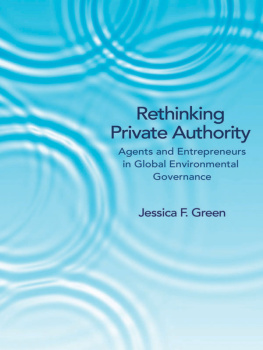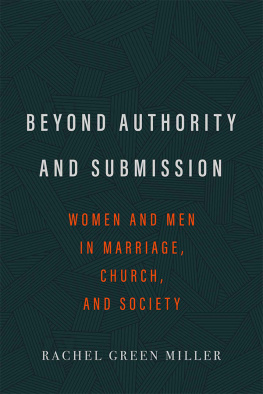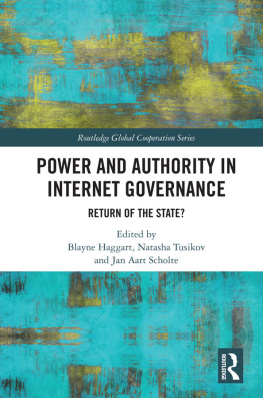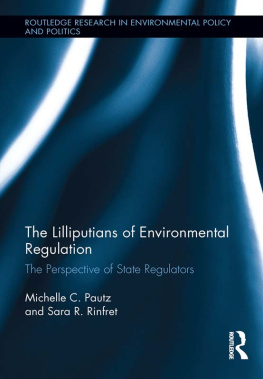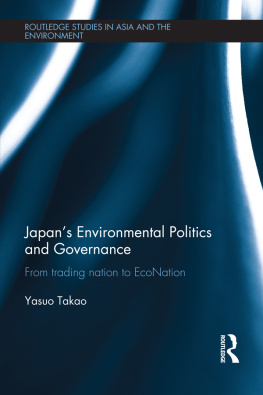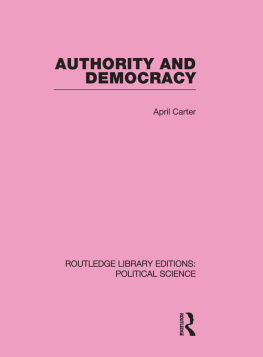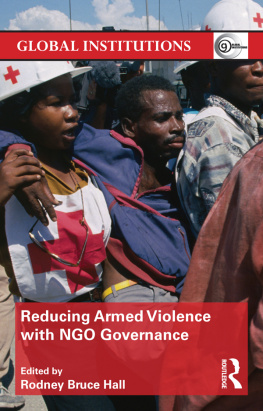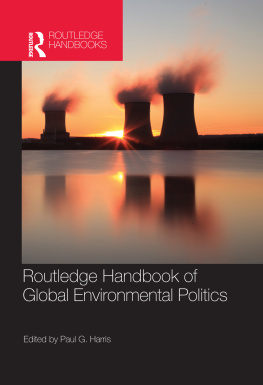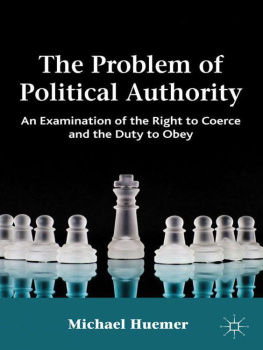Copyright 2014 by Princeton University Press
Published by Princeton University Press, 41 William Street, Princeton, New Jersey 08540
In the United Kingdom: Princeton University Press, 6 Oxford Street, Woodstock, Oxfordshire OX20 1TW
press.princeton.edu
All Rights Reserved
Library of Congress Cataloging-in-Publication Data
Green, Jessica F.
Rethinking private authority : agents and entrepreneurs in global environmental governance / Jessica F. Green.
pages cm
Summary: Rethinking Private Authority examines the role of non-state actors in global environmental politics, arguing that a fuller understanding of their role requires a new way of conceptualizing private authority. Jessica Green identifies two distinct forms of private authorityone in which states delegate authority to private actors, and another in which entrepreneurial actors generate their own rules, persuading others to adopt them. Drawing on a wealth of empirical evidence spanning a century of environmental rule making, Green shows how the delegation of authority to private actors has played a small but consistent role in multilateral environmental agreements over the past fifty years, largely in the area of treaty implementation. This contrasts with entrepreneurial authority, where most private environmental rules have been created in the past two decades. Green traces how this dynamic and fast-growing form of private authority is becoming increasingly common in areas ranging from organic food to green building practices to sustainable tourism. She persuasively argues that the configuration of state preferences and the existing institutional landscape are paramount to explaining why private authority emerges and assumes the form that it does. In-depth cases on climate change provide evidence for her arguments. Groundbreaking in scope, Rethinking Private Authority demonstrates that authority in world politics is diffused across multiple levels and diverse actors, and it offers a more complete picture of how private actors are helping to shape our response to todays most pressing environmental problemsProvided by publisher.
Includes bibliographical references and index.
ISBN 978-0-691-15758-0 (hardback) ISBN 978-0-691-15759-7 (paperback)
1. Environmental policyInternational cooperation. 2. Public-private sector cooperation. 3. Non-governmental organizations. 4. Environmental law, International. 5. Industrial managementEnvironmental aspects. 6. CorporationsEnvironmental aspects. 7. Business enterprisesEnvironmental aspects. I. Title.
GE170.G7326 2013
333.7dc23
2013016011
British Library Cataloging-in-Publication Data is available
This book has been composed in Sabon
Printed on acid-free paper.
Printed in the United States of America
10 9 8 7 6 5 4 3 2 1
Acknowledgments
THIS BOOK WAS INITIALLY borne out of the questions I formulated during my time working at United Nations University. Faced with the policy challenges of promoting sustainable development, governments and international organizations alike voiced great optimism in the power of partnerships. I began to wonder, Why do governments need nonstate actors? What could they accomplish that governments and the UN system could not? I began investigating these questions from a policy perspective at UNU, and I am thankful to my former colleagues there, in particular Hamid Zakri, Sam Johnston, and Bradnee Chambers, for allowing me to pursue them.
Upon arriving at the Woodrow Wilson School at Princeton, I received generous support from the institution and wonderful training from its faculty. Bob Keohane has been an incredible mentor from the very first. I am a lucky beneficiary of Bobs tireless dedication to scholarship and to teaching. My other graduate advisers, Christina Davis and Emilie Hafner-Burton were, and continue to be, generous with their time and guidance. Their input has improved this book, and my scholarship, tremendously. Other faculty at Princeton, including Joanne Gowa, Helen Milner, Andy Moravcsik, Michael Oppenheimer, and Anne-Marie Slaughter, provided feedback on the earlier incarnation of this work (as my dissertation) and challenged me with big questions about the role of private authority in world politics.
In addition to sharing the battle scars of graduate school, other colleagues from Princeton have been sounding boards, editors, critics, and cheerleaders, including Sarah Bermeo, Sarah Bush, Tom Hale, David Hsu, Gwyneth McClendon, Eri Saikawa, Jordan Tama, and Dustin Tingley. Jeff Colgan and Mareike Kleine have read so many versions of this manuscript that they are undoubtedly relieved it is finally in print.
Beyond the halls of Princeton, I have benefited from the generosity of Ron Mitchell, whose data form the basis of my analysis in . Stu Shulman helped me through the various beta versions of the Coding Analysis Toolkit with which I coded and analyzed Rons data. I would also like to thank the many people I interviewed for this book, who patiently answered my questions about what is now ancient history concerning the climate change regime.
I have been fortunate to have supportive colleagues at Case Western Reserve University, who have all been extremely helpful in transforming this into a book project, both intellectually and logistically, including Joe White, Karen Beckwith, Justin Buchler, Katie Lavelle, Kelly McMann, Vince McHale, Pete Moore, and, in particular, Elliot Posner. I was able to complete the manuscript during my time at the Institute for International Law and Justice at the School of Law at New York University, thanks to Dick Stewart and its director, Robert Howse. For other helpful comments, suggestions, and critiques throughout the research process, I would also like to thank Ken Abbott, Liliana Andonova, Graeme Auld, Tim Bthe, Josh Busby, Ben Cashore, Burkard Eberlein, Jen Hadden, Virginia Haufler, Christer Jnsson, Jibecke Jonsson, Benedict Kingsbury, Duncan Snidal, Dick Stewart, Jonas Tallberg, Bryce Rudyk, David Victor, David Vogel, and Stepan Wood.
Some parts of this book have been published elsewhere. An early version of draws from my 2010 article Private Standards in the Climate Regime: The Greenhouse Gas Protocol, which was published in Business and Politics. I thank Palgrave Macmillan and De Gruyter and for permission to use these materials.
It has been a pleasure working with Chuck Myers at Princeton University Press, who has supported this project from the outset and capably guided me through the editorial and production process. His comments on the manuscript have improved it markedly.
Finally, none of this would be possible without the support of my wonderful familymy parents, Madeleine and Stephen, and my sister Julia, who all have cracked jokes when I despaired of ever finishing, and helped me keep things in perspective. More than anyone, my deepest thanks go to my husband John, whose love and patience are without parallel. He has been my intellectual partner, my best friend, and my most ardent supporter from the very beginning, believing in me when I did not, and doing so with incredible grace. I cannot begin to express my gratitude for his gifts of love and support.

